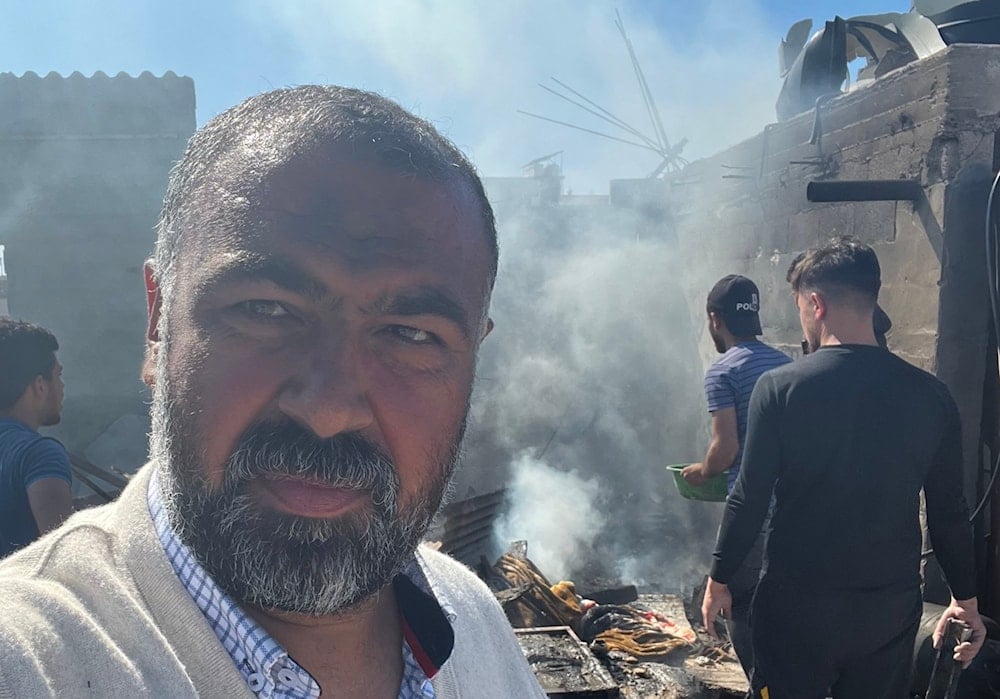Gaza-based journalist debunks 'Israel's' false location tag
The Israeli Foreign Ministry faces backlash after promoting false claims about a Gaza journalist’s location, spotlighting growing concerns over digital misinformation tools.
-

Palestinian Motasem A Dalloul reporting from the al-Zaytoun neighborhood following an Israeli airstrike on residential buildings, on May 16, 2024 (X/@AbujomaaGaza)
The Israeli Foreign Ministry has faced sharp criticism after falsely claiming that Gaza-based journalist Motasem A Dalloul was posting updates from Poland rather than reporting from the Gaza Strip.
In a tweet, the Ministry wrote: “196,900 followers being lied to by fake ‘journalist’ claiming to be in Gaza. New X feature reveals his actual location is Poland. Reporting from Gaza is fake & not reliable.”
196,900 followers being lied to by fake “journalist” claiming to be in Gaza. New @X feature reveals his actual location is Poland.
— Israel Foreign Ministry (@IsraelMFA) November 23, 2025
Reporting from Gaza is fake & not reliable. Makes you wonder how many more fake reports have you read? pic.twitter.com/sKjIDvLQbz
The Ministry cited X’s newly introduced “country of origin” label, which purports to indicate a user’s posting location using IP-related signals. However, X has not confirmed the label’s accuracy or methodology.
Dalloul quickly refuted the claim, posting a video from within Gaza and writing: “Good evening. For those who claim I’m in Poland and posting from there, I just want to tell you: If you recognize buildings like these in Poland, please let me know. If you see tents and camps like this, tell me if there’s anything similar in Poland. Goodbye.”
If you still believe that I am not based in Gaza pic.twitter.com/mJUmQ8oeov
— Motasem A Dalloul (@AbujomaaGaza) November 24, 2025
X’s new automated origin-label system has been criticized for misidentifying accounts across political and geographic lines. Users in the US, Europe, and West Asia have reported being tagged incorrectly, raising concerns that such labels could inadvertently spread misinformation or discredit journalists, political commentators, and activists.
As of now, "Israel’s" Foreign Ministry has not issued a correction, and X has not commented on the accuracy of the location tag applied to Dalloul’s account.
Broader disinformation networks highlighted
The controversy has also drawn attention to reporting showing that many active pro-"Israel" social-media influencers are not based in "Israel", but in countries such as India.
A major investigative piece by The New Arab found that Indian right-wing and Hindu-nationalist social-media networks have emerged as “key amplifiers of pro-Israel disinformation and anti-Palestinian narratives.” According to the analysis, India is “leading a global pro-Israel disinformation ecosystem,” producing viral content that attacks Palestinians, spreads unverified claims, and often mirrors talking points from Israeli officials.
Similar findings from Euronews and The Diplomat show Indian accounts, often aligned with Hindu-nationalist politics, circulating videos alleging Palestinians are staging injuries or inventing atrocities, claims repeatedly debunked by fact-checkers.
Meanwhile, NDTV has reported that war-related disinformation on X has become monetized, with influencers in India and elsewhere earning revenue from sensationalized or misleading content about the war.
Who is Motasem Dalloul?
Motasem Dalloul is a Palestinian journalist from Gaza City whose life and career have been defined by resilience, loss, and an unwavering commitment to documenting the realities of the Israeli genocide in Gaza.
Throughout the two-year war, Dalloul chose to remain in northern Gaza despite the risk of continuous Israeli bombardment. He and his family were forcibly displaced 13 times, most recently living in a tent in Gaza City’s al-Rimal neighborhood.
Gaza now 🌧️⛈️ pic.twitter.com/ktaxphQJyA
— Motasem A Dalloul (@AbujomaaGaza) November 25, 2025
Dalloul’s journalism has been shaped by deep personal tragedy. "Israel’s" military assaults have taken the lives of his wife and three of his sons. In February 2024, as famine gripped northern Gaza, his wife Riham and young son Abu Bakr were killed in an Israeli strike on her family’s home. Three months later, while searching the ruins of their destroyed house in al-Zaytoun, Israeli tank fire killed his son Yehya, whose remains he later found crushed by advancing armor.
In late 2025, during a desperate search for food, his 21-year-old son Ibrahim was killed along with friends as they attempted to reach southern Gaza for supplies. Dalloul learned of the killing only hours after US President Donald Trump announced a ceasefire. Ibrahim’s death marked the third son he lost to Israeli fire since the start of the war.
Even while enduring immense personal suffering, Dalloul continued reporting, documenting the humanitarian catastrophe facing Palestinians. He shared firsthand accounts of hunger, forcible displacement, destroyed infrastructure, economic collapse, and the emotional toll of war on families like his own.
Unprecedented and unbelievable
— Motasem A Dalloul (@AbujomaaGaza) November 25, 2025
Israeli destruction inflicted by the Israeli occupation military on our neighbourhood of Al Zaytoun, southeast of the Gaza City. pic.twitter.com/K3fxQnjtJy
A devoted father and journalist, Dalloul hoped to build a stable future for his children, even opening a large supermarket for them before the war reduced both the shop and their home to rubble. Today, he speaks with dignity and sorrow about the ongoing struggle to survive: a population without homes, income, or basic necessities, trying to rebuild amid the ruins.
Motasem Dalloul’s story is both the biography of a journalist and the lived history of Gaza itself, loss, perseverance, and the steadfast refusal to give up documenting truth, even as the war reshaped his life irrevocably.
Read more: Out of 270 journalists, 'Israel' killed 44 in Gaza displacement tents

 5 Min Read
5 Min Read








